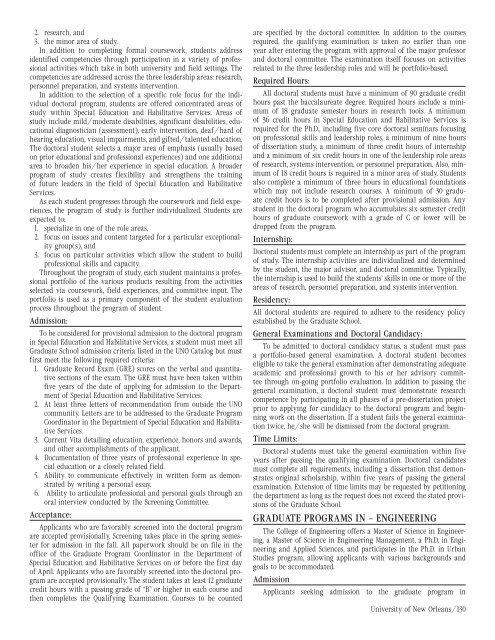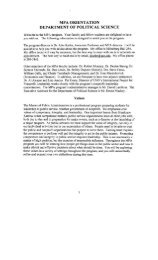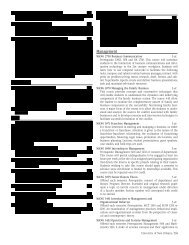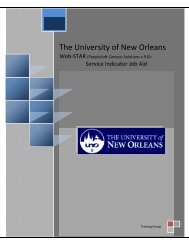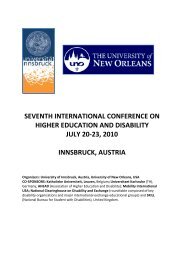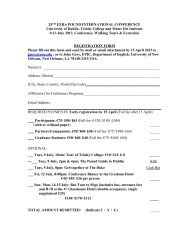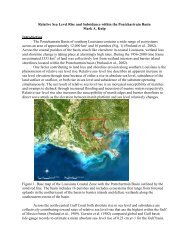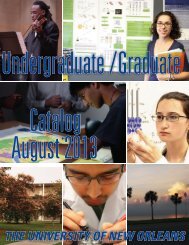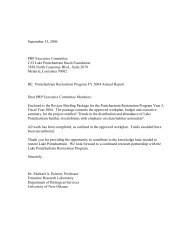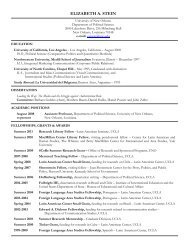Untitled - University of New Orleans
Untitled - University of New Orleans
Untitled - University of New Orleans
Create successful ePaper yourself
Turn your PDF publications into a flip-book with our unique Google optimized e-Paper software.
2. research, and<br />
3. the minor area <strong>of</strong> study.<br />
In addition to completing formal coursework, students address<br />
identified competencies through participation in a variety <strong>of</strong> pr<strong>of</strong>essional<br />
activities which take in both university and field settings. The<br />
competencies are addressed across the three leadership areas: research,<br />
personnel preparation, and systems intervention.<br />
In addition to the selection <strong>of</strong> a specific role focus for the individual<br />
doctoral program, students are <strong>of</strong>fered concentrated areas <strong>of</strong><br />
study within Special Education and Habilitative Services. Areas <strong>of</strong><br />
study include mild/moderate disabilities, significant disabilities, educational<br />
diagnostician (assessment), early intervention, deaf/hard <strong>of</strong><br />
hearing education, visual impairments, and gifted/talented education.<br />
The doctoral student selects a major area <strong>of</strong> emphasis (usually based<br />
on prior educational and pr<strong>of</strong>essional experiences) and one additional<br />
area to broaden his/her experience in special education. A broader<br />
program <strong>of</strong> study creates flexibility and strengthens the training<br />
<strong>of</strong> future leaders in the field <strong>of</strong> Special Education and Habilitative<br />
Services.<br />
As each student progresses through the coursework and field experiences,<br />
the program <strong>of</strong> study is further individualized. Students are<br />
expected to:<br />
1. specialize in one <strong>of</strong> the role areas,<br />
2. focus on issues and content targeted for a particular exceptionality<br />
group(s), and<br />
3. focus on particular activities which allow the student to build<br />
pr<strong>of</strong>essional skills and capacity.<br />
Throughout the program <strong>of</strong> study, each student maintains a pr<strong>of</strong>essional<br />
portfolio <strong>of</strong> the various products resulting from the activities<br />
selected via coursework, field experiences, and committee input. The<br />
portfolio is used as a primary component <strong>of</strong> the student evaluation<br />
process throughout the program <strong>of</strong> student.<br />
Admission:<br />
To be considered for provisional admission to the doctoral program<br />
in Special Education and Habilitative Services, a student must meet all<br />
Graduate School admission criteria listed in the UNO Catalog but must<br />
first meet the following required criteria:<br />
1. Graduate Record Exam (GRE) scores on the verbal and quantitative<br />
sections <strong>of</strong> the exam. The GRE must have been taken within<br />
five years <strong>of</strong> the date <strong>of</strong> applying for admission to the Department<br />
<strong>of</strong> Special Education and Habilitative Services.<br />
2. At least three letters <strong>of</strong> recommendation from outside the UNO<br />
community. Letters are to be addressed to the Graduate Program<br />
Coordinator in the Department <strong>of</strong> Special Education and Habilitative<br />
Services.<br />
3. Current Vita detailing education, experience, honors and awards,<br />
and other accomplishments <strong>of</strong> the applicant.<br />
4. Documentation <strong>of</strong> three years <strong>of</strong> pr<strong>of</strong>essional experience in special<br />
education or a closely related field.<br />
5. Ability to communicate effectively in written form as demonstrated<br />
by writing a personal essay.<br />
6. Ability to articulate pr<strong>of</strong>essional and personal goals through an<br />
oral interview conducted by the Screening Committee.<br />
Acceptance:<br />
Applicants who are favorably screened into the doctoral program<br />
are accepted provisionally. Screening takes place in the spring semester<br />
for admission in the fall. All paperwork should be on file in the<br />
<strong>of</strong>fice <strong>of</strong> the Graduate Program Coordinator in the Department <strong>of</strong><br />
Special Education and Habilitative Services on or before the first day<br />
<strong>of</strong> April. Applicants who are favorably screened into the doctoral program<br />
are accepted provisionally. The student takes at least 12 graduate<br />
credit hours with a passing grade <strong>of</strong> “B” or higher in each course and<br />
then completes the Qualifying Examination. Courses to be counted<br />
are specified by the doctoral committee. In addition to the courses<br />
required, the qualifying examination is taken no earlier than one<br />
year after entering the program with approval <strong>of</strong> the major pr<strong>of</strong>essor<br />
and doctoral committee. The examination itself focuses on activities<br />
related to the three leadership roles and will be portfolio-based.<br />
Required Hours:<br />
All doctoral students must have a minimum <strong>of</strong> 90 graduate credit<br />
hours past the baccalaureate degree. Required hours include a minimum<br />
<strong>of</strong> 18 graduate semester hours in research tools. A minimum<br />
<strong>of</strong> 36 credit hours in Special Education and Habilitative Services is<br />
required for the Ph.D., including five core doctoral seminars focusing<br />
on pr<strong>of</strong>essional skills and leadership roles, a minimum <strong>of</strong> nine hours<br />
<strong>of</strong> dissertation study, a minimum <strong>of</strong> three credit hours <strong>of</strong> internship<br />
and a minimum <strong>of</strong> six credit hours in one <strong>of</strong> the leadership role areas<br />
<strong>of</strong> research, systems intervention, or personnel preparation. Also, minimum<br />
<strong>of</strong> 18 credit hours is required in a minor area <strong>of</strong> study. Students<br />
also complete a minimum <strong>of</strong> three hours in educational foundations<br />
which may not include research courses. A minimum <strong>of</strong> 30 graduate<br />
credit hours is to be completed after provisional admission. Any<br />
student in the doctoral program who accumulates six semester credit<br />
hours <strong>of</strong> graduate coursework with a grade <strong>of</strong> C or lower will be<br />
dropped from the program.<br />
Internship:<br />
Doctoral students must complete an internship as part <strong>of</strong> the program<br />
<strong>of</strong> study. The internship activities are individualized and determined<br />
by the student, the major advisor, and doctoral committee. Typically,<br />
the internship is used to build the students’ skills in one or more <strong>of</strong> the<br />
areas <strong>of</strong> research, personnel preparation, and systems intervention.<br />
Residency:<br />
All doctoral students are required to adhere to the residency policy<br />
established by the Graduate School.<br />
General Examinations and Doctoral Candidacy:<br />
To be admitted to doctoral candidacy status, a student must pass<br />
a portfolio-based general examination. A doctoral student becomes<br />
eligible to take the general examination after demonstrating adequate<br />
academic and pr<strong>of</strong>essional growth to his or her advisory committee<br />
through on-going portfolio evaluation. In addition to passing the<br />
general examination, a doctoral student must demonstrate research<br />
competence by participating in all phases <strong>of</strong> a pre-dissertation project<br />
prior to applying for candidacy to the doctoral program and beginning<br />
work on the dissertation. If a student fails the general examination<br />
twice, he/she will be dismissed from the doctoral program.<br />
Time Limits:<br />
Doctoral students must take the general examination within five<br />
years after passing the qualifying examination. Doctoral candidates<br />
must complete all requirements, including a dissertation that demonstrates<br />
original scholarship, within five years <strong>of</strong> passing the general<br />
examination. Extension <strong>of</strong> time limits may be requested by petitioning<br />
the department as long as the request does not exceed the stated provisions<br />
<strong>of</strong> the Graduate School.<br />
GRADUATE PROGRAMS IN – ENGINEERING<br />
The College <strong>of</strong> Engineering <strong>of</strong>fers a Master <strong>of</strong> Science in Engineering,<br />
a Master <strong>of</strong> Science in Engineering Management, a Ph.D. in Engineering<br />
and Applied Sciences, and participates in the Ph.D. in Urban<br />
Studies program, allowing applicants with various backgrounds and<br />
goals to be accommodated.<br />
Admission<br />
Applicants seeking admission to the graduate program in<br />
<strong>University</strong> <strong>of</strong> <strong>New</strong> <strong>Orleans</strong>/130


